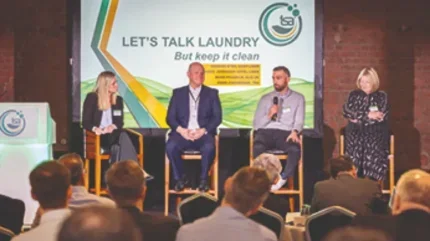
UK
At the recent Textile Services Association (TSA) 2024 National Congress (1 February) in Liverpool, three representatives from three laundries came clean about their views on where the UK’s textile services industry is now, in a panel chaired by (pictured left to right:)TSA’s Emma Andersson; Mark Franklin, Elis UK; Edward Syed, Dash Linen, and; Helen Wood, Johnsons Hotel Linen, made up the expert panel.
According to Helen Wood, today’s challenges include lack of Government support as so definitively evidenced during Covid and now with the energy hikes. She also believes it is imperative to get customers to respect linen. However, she feels the industry was on a “good journey reducing its carbon footprint”. She also felt we could be more collaborative as an industry in sharing experiences. The good news, she said, is that “working in a laundry is beginning to be seen as a career”.
Edward Syed observed that there used to be more family businesses around. “Will Dash see a third generation?” He admits to having had business disagreements with his father over the years, saying: “I don’t want to go through that with my kids. A family business is a lot harder to start up now than it was 35-40 years ago. It is hard graft and that was a different generation.’
Mark Franklin is keen that proper care is given to worker safety and cites lessons learned during his time at Toyota that can be applied to the laundry industry. “Safety first. At all times. If you identify risk, you reduce hazard. This is safer for the workforce. You come to work in good condition and you go home in the same heath. Wellbeing is important. There must be mutual respect for people [between management and workforce]. Some workers were there for 30-40 years – that was key in retention at Toyota.”
Franklin also believes that there has to be documented standardised working. “We have to have standards. However, they can be known but not always documented. By documenting them, you can improve. Continuous improvement is absolutely key in all sectors, all industries.”
Helen Wood wondered about gender balance in the sector and how things have changed since she started in the industry. “Would it be easier now? There are more women in senior roles and a better work/life balance. It was never difficult for women to join a laundry, but it was traditionally in roles such as service and office. Now women are entering at a higher level than previously and having opportunities in transport and production – they are moving into different areas. It is a really good industry to come into. If you have a good work ethic and take responsibility it is a good industry in which to succeed or exceed aspirations.” She stressed that whatever gender, it is important it is the right person for the job.
Franklin said the challenges for large groups such as Elis, which employs 5,000 people, is communication, suggesting that if you think you are communicating enough, you aren’t. “Let people know what the goals are so they can engage. You can’t spend five days in an office. I like to get out and visit sites. Try to make sure a culture of proximity management. Face to face is good. It is not always good to be ‘Teams players’. Physically standing in front of our teams is key. When we have a problem i.e., a breakdown (it does happen from time to time)– we can rely on another site to pitch in.”
Syed spoke about ethnic diversity and how TSA members can improve in this area. “I have never felt out of place or uncomfortable. At the last TSA conference there was talk that there should be more ethnic minorities in management positions. Where I am in south London a lot of employers are from ethnic minorities. I had a privileged upbringing and never had to apply for a job. I went straight into work with my Dad. But we should all think of how we can encourage people to put themselves forward for roles. Role models are important. And it should not come across as trying to replace people. No ticking boxes, it has to be on merit. But we should encourage minorities to apply.”
KPIs
Wood said it was difficult to choose one KPI: “Growth? Price? People? Profit? But it has to be profit – we are a plc, after all. If we achieve profit, we achieve growth.”
“Eight years ago, I was surprised that customers had so much power, not returning product and that was accepted as being OK! We are working on things to change that. I am committed to CSR which was not on my agenda 10 years and now it is at the forefront,” said Franklin.
For Syed, the major KPI is to maintain tip top product standards. “Dash is a table linen specialist – we produce hand folded table linen. However, we are looking to automate as much as possible. But the technology is not there yet. It has to be perfect. We do have a new tunnel finisher and garment folder which is working very well. We are looking to diversify, but by necessity we are more labour intensive than most.”
Photo: Chris Whittam Photography






